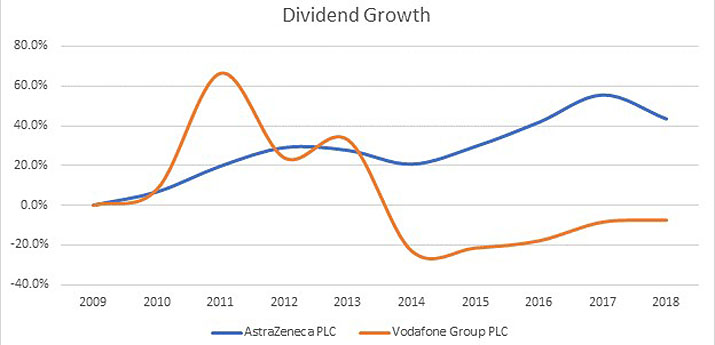
In the present low-rate environment, many income-seeking investors have been forced to take more risk by moving out of bonds into stocks. And who could blame them, considering the extra yield that can earned by investing in the FTSE 100 - currently 4.6%, relative to gilts (1.2%) or a diversified basket of sterling-denominated corporate bonds (2.4%).
While the current dividend yield of the FTSE 100 is appealing, dividend-focused equity strategies, such as those offered by BMO UK Income Leaders ETF and iShares UK Dividend ETF squeeze even more income out of the index. The BMO ETF offers exposure to 30 stocks and currently yields 5.3%, while the iShares ETF holds 50 stocks and offers an even higher 6.8% yield.
Taken at face value, the iShares ETF appears more diversified and offers more value. But when it comes to dividend investing, sometimes less now can mean more over the long-term. Dividend traps, or yields that are too good to be true, are not uncommon with income-paying stocks. Sometimes the reason for a high yield is the result of a drop in the share price caused by trouble in the business. In that situation, a high yield can often be easily followed by the company cutting or suspending pay outs in the future.
Avoiding dividend traps completely may not be feasible but opting for a strategy that screens companies for quality can help. When it comes to dividend-focused equity ETFs, it pays to look under the bonnet to see if the indices they track do this.
Quality Comes First
The MSCI UK Select Quality Yield Index, tracked by the BMO ETF, favours companies that are more profitable and less indebted than their peers. Companies are compared by assigning a “quality” score derived from business fundamentals, such as return on equity, earnings variability and the ratio of debt to equity.
Once the quality filter is applied, MSCI then removes the bottom 50% companies from the selection. This step is very important as typically these would be the companies with the weakest growth signals and so could be prone to dividend cuts in the future. Of the remaining group, the index then picks only the top half of companies with the highest dividend yield and then weights them according to their market capitalisation.
By contrast, the FTSE UK Dividend Plus, the index tracked by the iShares ETF, does not screen for quality. It simply tilts its portfolio towards the UK stocks with the highest expected dividend yield.
Quality Companies are Consistent
Higher quality companies typically pay dividends through thick and thin. A classic example of this is Coca Cola, a company that has paid increasing dividends for an uninterrupted 57 years and has been a stalwart in the portfolio of Warren Buffett’s Berkshire Hathaway since 1988.
Of course, not every company can boast such a perfect track record. In fact, reducing dividends is not always a bad sign. For example, companies might reduce dividend payouts in order to finance growth opportunities, repay debt or pile up cash in anticipation of lower growth conditions. So, the key here is to identify companies with a trend of stable and gently increasing dividend payouts, as this is typically a sign of resilience that rewards investors over the long term.
To illustrate, let’s compare the iShares ETF’s top constituent Vodafone, which current yields 5.1%, with BMO’s AstraZeneca, which offers a yield of 2.9%. It is worth pointing out that Vodafone is not held by BMO’s ETF.
As we can see, in the 2008-2018 period the dividend growth trend of Vodafone is inconsistent, with significant fluctuations from one year to the next. By contrast, AstraZeneca’s is significantly more stable and has an upward slope. In short, AstraZeneca’s stronger profitability has made it a more reliable dividend payer.

Quality Can Preserve Capital
In most conditions, income investors are better served by a combination of moderate yield and capital appreciation. In fact, when investing for income, capital preservation is particularly important as investors may use dividends to fund day-to-day expenditure rather than reinvest them. A dividend that grows over time, meanwhile, can help stave off the erosionary effects of inflation.
Looking at the five-year annualised returns of the indices tracked by the iShares and BMO ETFs, both have delivered positive total returns, with the MSCI index outperforming by 2.68%. However, when breaking down the returns we see that while the FTSE strategy has paid a larger dividend over the period, this higher yield has been paid not by company profits, but by eating into the capital. This serves to underline that simply going for high yield, while tempting, may not be the best course of action.
Dividend-focused equity strategies can be a good choice for income-seeking investors, and using low-cost ETFs certainly helps to keep a tight rein on management fees. However, when considering ETFs it pays not to assume that all indices are the same.







.jpg)




















